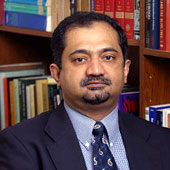Muslim Women: The Challenge Ahead
What kind of challenges do Muslim women face in an era of globalization?
January 10, 2001
In Afghanistan, the Talibanization of Islam has had many consequences, but none more pronounced than the assault on the civil liberties of women. In the name of Islam, a religion which began when God asked “man” to “read” (the first word of the Koran revealed to Muhammad was “read” — or “iqra”) — the Taliban have systematically sought to deprive women of education, the essence of emancipation.
So far, most of the rescue attempts have come from the West. But the humanitarian concern for the plight of Muslim women is often accompanied by rhetorical overtones that demonize Islam. Muslims, in response, imagine these efforts as attempts to antagonize them and to ridicule their Muslim beliefs.
Muslims often perceive this as a double standard, which hurts the prospects for change. For example, when the Taliban use ideological rhetoric to deprive Muslim women access to basic education, Western media and agencies condemn them (justifiably) and also attack Islam (unnecessarily). Muslims who are willing to work with Western agencies to improve the conditions of Muslim women feel forced to retreat in the face of these double standards.
Unfortunately, Muslim feminists have not helped their cause either. Muslim feminists are broadly of two types — extremely westernized or too traditional. Westernized Muslim feminists generate a style of rhetoric that mimics their Western counterparts. Their western worldview and lifestyle not only scares the traditional Muslim male but most Muslim women as well.
As a result, the projects and goals they advocate are delegitimized by mainstream Muslims because of their manifest disregard and disrespect for Islam and traditional Muslim values. Of course they do win many supporters and admirers among western feminist and liberal establishment, but this does little to ameliorate the plight of Muslim women.
The so-called Islamic feminists represent the other extreme of Muslim feminism. They seem to be energized by a perceived absence of “Islam” in Westernized feminists and view them as a threat to Islamic heritage and the institutions of family, marriage and modesty. Thus, both groups tend to confirm or reinforce the stereotype held by the other.
Meanwhile, ordinary Muslim women continue to suffer. Muslim men at the moment engross themselves in preparing for civilizational clashes or civilizational dialogues. They cannot afford to pay attention to the plight of women (so they believe) while Muslim men are enslaved and Muslim lands under attack.
I think we must try to increase awareness among Muslims everywhere about women’s fundamental right to education, equality, dignity and freedom of choice and action.
American Muslims, for example, can not only provide much-needed financial resources and intellectual leadership, they can help initiate an awakening among Muslims to the overwhelming domination of men in Islamic legal studies.
There is little doubt that when men alone interpret Islamic juristic traditions, they do it from a masculine perspective. It is important that Islam produce more and more female scholars to balance the scales.
Islamic thinkers (generally men) have acknowledged that men and women have fundamentally different natures. While men tend to be absolutist, women tend towards infinity. When men emphasize justice, women encourage mercy and tolerance, when men pursue knowledge, women seek understanding.
But these same thinkers recognize that, in Islam, all of these characteristics, masculine and feminine, are ultimately human manifestations of divine attributes. And just as justice without mercy can be cruel, masculine understanding without feminine temperament can be too harsh. It is therefore time we encouraged more women scholars of Islam and explicitly seek their understanding of Islam.
Read previous
Colin Powell Versus the Hawks
January 9, 2001
